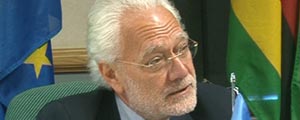
THE European Investment Bank is expected to start injecting working capital into the private sector in the second half of this year to ease liquidity problems in the economy, sources close to the deal have said.
VICTORIA MTOMBA BUSINESS REPORTER
According to sources, an EIB delegation recently met players in the mining, manufacturing and tourism sectors and sealed the deal.
“There was a big meeting between EIB and the private sector at the European Union offices on how to start using EIB funding for new and existing investments. This should start in the second half of the year,” the source said.
However, European Union Ambassador to Zimbabwe Aldo Dell’Ariccia told NewsDay yesterday that the EIB delegation was on an exploratory mission to meet with banks that could act as conduits to channel the loans to private sector companies.
Dell’ Ariccia said the mission was also set to have contact with the private sector representatives directly in order to better understand and respond to their needs.
“It is clear that the role of the private sector to reflourish the economy is crucial, but that there are many challenges to face.
“On one of them — finance — the EIB hopes to be able to provide support to and to bring the needed added value. When exactly — and for what amount — the EIB can provide this financial support is, however, not yet defined,” he said.
- Chamisa under fire over US$120K donation
- Mavhunga puts DeMbare into Chibuku quarterfinals
- Pension funds bet on Cabora Bassa oilfields
- Councils defy govt fire tender directive
Keep Reading
“Also the question how EIB can provide the support to the private sector — indirectly through commercial banks or directly to certain investors for bigger investments — will now be considered following the various fruitful meetings which the senior officials of the EIB had in Harare.”
He said the investment climate in Zimbabwe posed huge challenges that have to be addressed to attract more investors into the country.
Dell’ Ariccia said the indigenisation policy needed to be clarified so as not to scare away potential investors.
“A typical example here is the discussion around indigenisation, which is an important and valuable discussion to be made, but as long as its meaning is not clarified an investor from abroad will be hesitant to bring his money into the country as he will certainly have less risky ways in the world to invest; this will influence his choice and decision where to invest and to convince him the only way is to give clarity and ideally to set a concrete example,” he said.
The country has been failing to attract foreign direct investments (FDIs) since 2009 with the highest figure being $400 million in 2013 which was below the country’s regional peers that were attracting FDIs above $1 billion.











